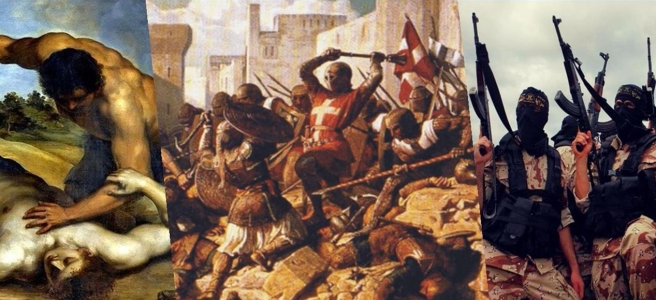DEADLINE FOR SUBMISSIONS: JANUARY 1st, 2018
2018 CREOR colloquium on Religion and Violence
Conference Topic: Religion and Violence: Sources, History, and the Contemporary World
Co-chairs: Gerbern S. Oegema and André Gagné
Dates: April 17-20, 2018
Location: McGill University and Concordia University, Montreal, Quebec, Canada.
Submission Deadline: January 1st, 2018.
Contact: creor2018rv@gmail.com
Description of the conference:
The McGill Centre for Research on Religion (CREOR), in collaboration with Concordia University, invites graduate students and emerging scholars to participate in a colloquium on Religion and Violence.
In recent years, religion and violence have become semantically linked, such that violence is often seen as inherent to religious practices and beliefs. This association has affected some religions more than others; Islam, in particular, is increasingly defined in public discourse by its relationship to international terrorism, such that the term fundamentalism is now often used exclusively to refer to Islamic fundamentalism (Juergensmeyer 2006, 139).
While some scholars, such as William Cavanaugh, insist that drawing a distinction between secular and religious violence is unhelpful and should be avoided, the so-called myth of religious violence – the idea that religion causes violence – has become commonplace in the contemporary world (Cavanaugh 2009, 56). Consequently, religiously motivated acts of violence are often treated as more egregious and difficult to address than non-religious acts of violence. This perception has resulted in the creation of specialized programs, task forces, and legislation to address the supposed problem of religious violence. Scholarship on religion has also been affected by the close association between violence and religion; since 2001, the volume of books and articles on the connection between religion and violence has increased dramatically (Avelos 2011, 137).
However, despite the overwhelming focus on the topic from governments, policy advisors, researchers, and academics, it remains unclear what differentiates religious violence from other forms of violence or what connects religious violence to religion, its traditions, texts, and peoples. While scripture remains the starting point for many investigations into the relationship between religion and violence, there exists a gap between historians, literary scholars, and social scientists. This colloquium seeks to reexamine the relationship between religion and violence in the contemporary world by reflecting on the traditional scriptural sources that are often ascribed to religious violence.
Participants are encouraged to submit papers that reflect on the following questions and themes: How has the understanding of the relationship between violence and religion changed over time? How does methodology shape the scholarship on religion and violence? Is religious violence different than secular/non-religious violence? By drawing attention to religious violence how has political discourse overlooked the religious victims of religious or secular violence? Is there a place for discussions of religious conceptions of non-violence in the scholarship on religion and violence? How can policy makers use scriptural sources to promote peace and social cohesion?
Themes and Categories:
- Anti-terrorism and de-radicalization
- Construction/ deconstruction of religion
- Culture vs scripture
- Culture of violence
- Eastern vs Western religious violence
- Effects of post-colonialism
- Extremism and radicalization
- Gender and sexuality
- Gender and development
- Methodological approaches to religion and violence
- Pluralism
- Political violence vs religious violence
- Religion and community building
- Radical environmentalism
- Religious freedom vs control
- Religion and globalization
- Religion and nationalism
- Religion and violence in the media
- Ritual and violence
- State security
- Terrorism
- The role of hermeneutics
- Toleration
- Violence and textual traditions
- Violence in the name of secularity
Guidelines for proposals:
Please submit a 250-word abstract explaining the topic and main arguments of the paper by January 1st, 2018. All disciplines and fields welcome. Papers must engage in and contribute to the scholarly discourse; works of advocacy or mere summary will not be considered. Presentations may be in either English or French and should not exceed 20 minutes. Proposals should include all contact information including institutional affiliation. These proposals as well as any questions or requests for further information should be sent to the following address: creor2018rv@gmail.com
Conference format:
This four day conference will bring together international experts from various academic disciplines, as well as policy makers, journalists, non-governmental organizations, and members of different faith traditions. In addition to plenary presentations from scholarly experts, the colloquium will host a series of workshops and fishbowl sessions that will be open to the public. Two full days of the colloquium will be dedicated to graduate student presentations and events. This colloquium is a collaboration between McGill University’s Centre for Research on Religion and Concordia University’s Department of Theological Studies, events will therefore be hosted on both campuses.
Sources Cited:
Juergensmeyer, Mark. “Religion as a Cause of Terrorism” in The Roots of Terrorism (New York: Routledge, 2006).
Cavanaugh, William. The Myth of Religious Violence: Secular Ideology and the Roots of Modern Conflict (New York: Oxford University Press 2009).
Avelos, Hector. “Explaining Religious Violence: Retrospects and Prospects” in Blackwell Companion to Religion and Violence (Malden, MA: Blackwell Publishing, 2011).
